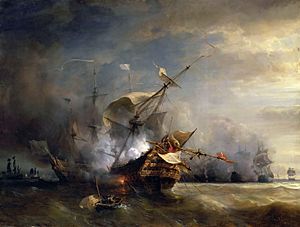Battle at The Lizard facts for kids
Quick facts for kids Battle at the Lizard |
|||||||
|---|---|---|---|---|---|---|---|
| Part of the War of the Spanish Succession | |||||||
 Battle at The Lizard, Jean Antoine Théodore de Gudin |
|||||||
|
|||||||
| Belligerents | |||||||
| Commanders and leaders | |||||||
| Strength | |||||||
| 12 warships | 5 warships 130 merchant ships |
||||||
| Casualties and losses | |||||||
| 300 killed and wounded No ships lost |
800 killed and wounded 1,500 captured 1 warship destroyed 3 warships captured 15 merchant ships captured |
||||||
The naval Battle of the Lizard was a sea fight that happened on October 21, 1707. It took place near Lizard Point, Cornwall, which is a headland in England. This battle was part of a bigger conflict called the War of the Spanish Succession. In this fight, two French naval groups, led by René Duguay-Trouin and Claude de Forbin, attacked an English convoy (a group of ships traveling together) that was protected by warships under Commodore Richard Edwards.
Duguay-Trouin and Forbin were very successful French naval commanders. They caused a lot of trouble for the ships carrying goods for the British and their allies.
Contents
What Happened During the Battle?
The Start of the Conflict
On October 20, 1707, a large group of English merchant ships left Plymouth. There were between 80 and 130 of these ships, and they were heading to Portugal. They were carrying important supplies for the war happening in Spain. Five English warships, led by Commodore Edwards, were protecting them.
The French Attack
The very next day, near Lizard Point, the English ships were spotted. Two French naval groups, each with six warships, found them. Even though Forbin was technically the higher-ranking French officer, Duguay-Trouin was known for being more daring. His ships led the charge and took most of the damage during the battle.
The Outcome of the Fight
The battle was a big win for the French. They captured three English warships: the 80-gun Cumberland, and the 50-gun ships Chester and Ruby. Another English warship, the 80-gun Devonshire, fought bravely for several hours against seven French ships. But it caught fire and exploded. Only three out of 500 sailors on board survived.
One English ship, the Royal Oak, managed to escape to Kinsale (a port in Ireland) with a few merchant ships.
How Many Merchant Ships Were Captured?
Historians don't fully agree on how many merchant ships the French captured. Some French records say they took 60 out of 80 ships. However, some British reports claim no merchant ships were captured at all.
The fact that the two French commanders, René Duguay-Trouin and Claude de Forbin, argued for many years about who played the biggest part in the victory suggests that a good number of ships were indeed captured. It's likely the real number is somewhere in the middle. One source, "Bibliographie maritime française" by Polak, suggests that 15 merchant ships were captured.
Ships Involved in the Battle
British Ships (Commodore Edwards)
The British fleet included five warships protecting the convoy. These were:
- The Cumberland (80 guns), which was Commodore Edwards's ship and surrendered.
- The Devonshire (80 guns), which exploded during the battle.
- The Royal Oak (76 guns), which managed to escape.
- The Chester (50 guns), which was captured.
- The Ruby (50 guns), which was also captured.
French Ships (Admiral Forbin)
Admiral Forbin's squadron had several ships, including:
- The Mars (54 guns), Forbin's flagship.
- The Blackwall (54 guns).
- The Salisbury (52 guns).
- The Protée (48 guns).
- The Jersey (46 guns).
- The Griffon (44 guns).
- The Dauphine (44 guns).
- The Fidèle (44 guns).
- The Dryade (32 guns).
French Ships (Captain Duguay-Trouin)
Captain Duguay-Trouin's squadron also had several powerful ships, such as:
- The Lys (72 guns), Duguay-Trouin's flagship.
- The Achille (64 guns).
- The Jason (54 guns).
- The Maure (50 guns).
- The Amazone (40 guns).
- The Gloire (38 guns).
 | Jackie Robinson |
 | Jack Johnson |
 | Althea Gibson |
 | Arthur Ashe |
 | Muhammad Ali |

